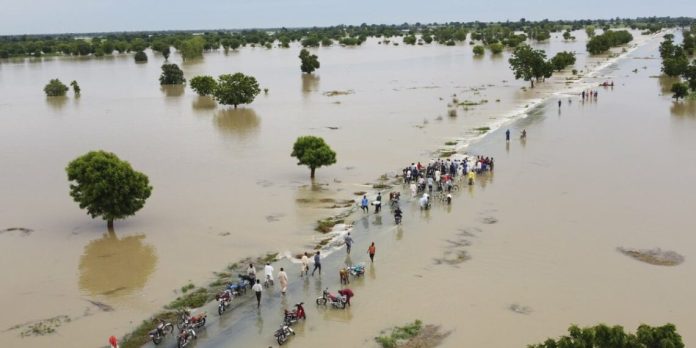The Food and Agriculture Organisation (FAO), of the United Nations says 1.39 million hectares of cropland have been affected by flooding, exacerbating food insecurity in Northeast Nigeria.
Its Head of Office for the Northeast, Mr. Daouda Doumbia, said this on Wednesday in Yola, during the 2024 World Food Day (WFD), organised by FAO in partnership with the Adamawa Government.
The News Agency of Nigeria (NAN) reports that the theme of the 2024 WFD is “Right to Food for a Better Life and a Better Future: Leave No One Behind”.
Doumbia, represented by Dr Abdullahi Usman, FAO Field Office Coordinator for Adamawa, emphasised that the region faces severe food insecurity challenges due to climate change.
According to him, from Sept. 16 to 30, approximately 3.82 million hectares of land were flooded, affecting 1.39 million hectares of cropland.
“The hardest-hit states are Borno, with 143,395 hectares flooded, and Adamawa, with 58,088 hectares of farmland affected.
“Potential production losses for maize alone are estimated at 486,000 tons, sufficient to feed about four million people for a year.”
He added that across Borno, Adamawa, and Yobe states, over 104,000 hectares of rainfed cropland and 6,570 hectares of irrigated cropland were submerged, leading to estimated food losses of 166,731 metric tons.
The FAO official further highlighted the severity of malnutrition, noting that about three million children under-five in Nigeria are stunted, reflecting inadequate access to essential nutrients.
He explained that FAO was supporting affected communities in the three states by distributing ‘Tom Brown’, a locally produced high-nutrient supplementary food, targeting 4,680 under-five children.
He added that 49,000 households would receive improved seeds, NPK fertiliser, and water pumps to restore livelihoods during the upcoming 2024 dry season planting.
Similarly, Prof David Jatau, Commissioner for Agriculture in Adamawa, noted that globally, about 2.8 billion people cannot afford a healthy diet, largely due to smallholder farmers’ limited access to mechanised farming tools.
Jatau, represented by Mrs Halima Mohammed, Programme Manager, Adamawa Agricultural Development Agency, acknowledged progress toward achieving zero hunger by 2030.
He, however, stressed that hunger and malnutrition still affect millions worldwide.
The Commissioner called on stakeholders to develop strategies to enhance crop yields, especially in the face of climate change, by introducing drought-tolerant and high-yielding crop varieties.
Mr Bello Diram, Commissioner for Reconstruction, Rehabilitation, Reintegration, and Human Services, highlighted the state’s efforts to support farmers.
“The state government has launched initiatives to provide access to farming equipment, high-quality seeds, and fertilisers, empowering local farmers to boost food production in spite of the challenges caused by flooding,” he said.
According to him, food insecurity and social disorder have affected over seven million people across Africa.
“In Northeast Nigeria, over 2.5 million people have been displaced, with 8.7 million people affected by food insecurity.
“In Adamawa, flooding has impacted more than 50,000 people, causing significant damage to farmlands and infrastructure, which requires urgent and effective intervention.”
Diram acknowledged the critical role smallholder farmers play in maintaining food security in Adamawa, underscoring the importance of supporting them in overcoming challenges posed by climate change and floods. (NAN)


